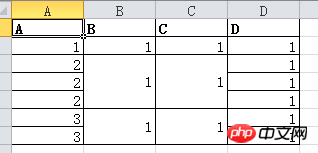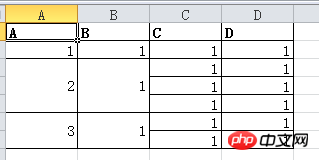Python's DataFrame implements excel merged cells_python
This article mainly introduces the DataFrame in python to implement excel merging cells in detail. It has a certain reference value. Interested friends can refer to it.
I often encounter the need to merge cells at work. The data is output to excel, and some of the cells need to be merged. For example, in the table below, the corresponding cells in columns B and C need to be merged based on the value of column A

2. Define a my_mergewr_excel method. The parameters are: the path to output excel, the key_cols list used to determine whether it needs to be merged, and the list used to indicate which columns of cells need to be merged.
3. Add MY_DataFrame Encapsulated as a My_Module module for reuse.
2 , if it is judged that CN is greater than 1, the group needs to be merged, otherwise the group (row) does not need to be merged (CN=1 means that the data row of this group is unique and does not need to be merged)
3. Corresponding to the group that needs to be merged, judge the current column Whether it is in the given parameter [Merge Column], if so, use merge to write excel cells, otherwise, just write excel cells normally.
4. In the column that needs to be merged, if RN=1, call merge_range and write CN cells at once. If RN>1, skip the cell because RN=1 At that time, the cell has been merged and written. If erge_range is called repeatedly, an error will be reported when opening the excel document.

# -*- coding: utf-8 -*-
"""
Created on 20170301
@author: ARK-Z
"""
import xlsxwriter
import pandas as pd
class My_DataFrame(pd.DataFrame):
def __init__(self, data=None, index=None, columns=None, dtype=None, copy=False):
pd.DataFrame.__init__(self, data, index, columns, dtype, copy)
def my_mergewr_excel(self,path,key_cols=[],merge_cols=[]):
# sheet_name='Sheet1', na_rep='', float_format=None, columns=None, header=True, index=True, index_label=None, startrow=0, startcol=0, engine=None, merge_cells=True, encoding=None, inf_rep='inf', verbose=True):
self_copy=My_DataFrame(self,copy=True)
line_cn=self_copy.index.size
cols=list(self_copy.columns.values)
if all([v in cols for i,v in enumerate(key_cols)])==False: #校验key_cols中各元素 是否都包含与对象的列
print("key_cols is not completely include object's columns")
return False
if all([v in cols for i,v in enumerate(merge_cols)])==False: #校验merge_cols中各元素 是否都包含与对象的列
print("merge_cols is not completely include object's columns")
return False
wb2007 = xlsxwriter.Workbook(path)
worksheet2007 = wb2007.add_worksheet()
format_top = wb2007.add_format({'border':1,'bold':True,'text_wrap':True})
format_other = wb2007.add_format({'border':1,'valign':'vcenter'})
for i,value in enumerate(cols): #写表头
#print(value)
worksheet2007.write(0,i,value,format_top)
#merge_cols=['B','A','C']
#key_cols=['A','B']
if key_cols ==[]: #如果key_cols 参数不传值,则无需合并
self_copy['RN']=1
self_copy['CN']=1
else:
self_copy['RN']=self_copy.groupby(key_cols,as_index=False).rank(method='first').ix[:,0] #以key_cols作为是否合并的依据
self_copy['CN']=self_copy.groupby(key_cols,as_index=False).rank(method='max').ix[:,0]
#print(self)
for i in range(line_cn):
if self_copy.ix[i,'CN']>1:
#print('该行有需要合并的单元格')
for j,col in enumerate(cols):
#print(self_copy.ix[i,col])
if col in (merge_cols): #哪些列需要合并
if self_copy.ix[i,'RN']==1: #合并写第一个单元格,下一个第一个将不再写
worksheet2007.merge_range(i+1,j,i+int(self_copy.ix[i,'CN']),j, self_copy.ix[i,col],format_other) ##合并单元格,根据LINE_SET[7]判断需要合并几个
#worksheet2007.write(i+1,j,df.ix[i,col])
else:
pass
#worksheet2007.write(i+1,j,df.ix[i,j])
else:
worksheet2007.write(i+1,j,self_copy.ix[i,col],format_other)
#print(',')
else:
#print('该行无需要合并的单元格')
for j,col in enumerate(cols):
#print(df.ix[i,col])
worksheet2007.write(i+1,j,self_copy.ix[i,col],format_other)
wb2007.close()
self_copy.drop('CN', axis=1)
self_copy.drop('RN', axis=1)import My_Module
DF=My_DataFrame({'A':[1,2,2,2,3,3],'B':[1,1,1,1,1,1],'C':[1,1,1,1,1,1],'D':[1,1,1,1,1,1]})
DF
Out[120]:
A B C D
0 1 1 1 1
1 2 1 1 1
2 2 1 1 1
3 2 1 1 1
4 3 1 1 1
5 3 1 1 1
DF.my_mergewr_excel('000_2.xlsx',['A'],['B','C'])
DF.my_mergewr_excel('000_2.xlsx',['A'],['A','B'])

The above is the detailed content of Python's DataFrame implements excel merged cells_python. For more information, please follow other related articles on the PHP Chinese website!

Hot AI Tools

Undresser.AI Undress
AI-powered app for creating realistic nude photos

AI Clothes Remover
Online AI tool for removing clothes from photos.

Undress AI Tool
Undress images for free

Clothoff.io
AI clothes remover

Video Face Swap
Swap faces in any video effortlessly with our completely free AI face swap tool!

Hot Article

Hot Tools

Notepad++7.3.1
Easy-to-use and free code editor

SublimeText3 Chinese version
Chinese version, very easy to use

Zend Studio 13.0.1
Powerful PHP integrated development environment

Dreamweaver CS6
Visual web development tools

SublimeText3 Mac version
God-level code editing software (SublimeText3)

Hot Topics
 1662
1662
 14
14
 1418
1418
 52
52
 1311
1311
 25
25
 1261
1261
 29
29
 1234
1234
 24
24
 PHP and Python: Different Paradigms Explained
Apr 18, 2025 am 12:26 AM
PHP and Python: Different Paradigms Explained
Apr 18, 2025 am 12:26 AM
PHP is mainly procedural programming, but also supports object-oriented programming (OOP); Python supports a variety of paradigms, including OOP, functional and procedural programming. PHP is suitable for web development, and Python is suitable for a variety of applications such as data analysis and machine learning.
 Choosing Between PHP and Python: A Guide
Apr 18, 2025 am 12:24 AM
Choosing Between PHP and Python: A Guide
Apr 18, 2025 am 12:24 AM
PHP is suitable for web development and rapid prototyping, and Python is suitable for data science and machine learning. 1.PHP is used for dynamic web development, with simple syntax and suitable for rapid development. 2. Python has concise syntax, is suitable for multiple fields, and has a strong library ecosystem.
 PHP and Python: A Deep Dive into Their History
Apr 18, 2025 am 12:25 AM
PHP and Python: A Deep Dive into Their History
Apr 18, 2025 am 12:25 AM
PHP originated in 1994 and was developed by RasmusLerdorf. It was originally used to track website visitors and gradually evolved into a server-side scripting language and was widely used in web development. Python was developed by Guidovan Rossum in the late 1980s and was first released in 1991. It emphasizes code readability and simplicity, and is suitable for scientific computing, data analysis and other fields.
 Python vs. JavaScript: The Learning Curve and Ease of Use
Apr 16, 2025 am 12:12 AM
Python vs. JavaScript: The Learning Curve and Ease of Use
Apr 16, 2025 am 12:12 AM
Python is more suitable for beginners, with a smooth learning curve and concise syntax; JavaScript is suitable for front-end development, with a steep learning curve and flexible syntax. 1. Python syntax is intuitive and suitable for data science and back-end development. 2. JavaScript is flexible and widely used in front-end and server-side programming.
 How to run sublime code python
Apr 16, 2025 am 08:48 AM
How to run sublime code python
Apr 16, 2025 am 08:48 AM
To run Python code in Sublime Text, you need to install the Python plug-in first, then create a .py file and write the code, and finally press Ctrl B to run the code, and the output will be displayed in the console.
 Where to write code in vscode
Apr 15, 2025 pm 09:54 PM
Where to write code in vscode
Apr 15, 2025 pm 09:54 PM
Writing code in Visual Studio Code (VSCode) is simple and easy to use. Just install VSCode, create a project, select a language, create a file, write code, save and run it. The advantages of VSCode include cross-platform, free and open source, powerful features, rich extensions, and lightweight and fast.
 Can visual studio code be used in python
Apr 15, 2025 pm 08:18 PM
Can visual studio code be used in python
Apr 15, 2025 pm 08:18 PM
VS Code can be used to write Python and provides many features that make it an ideal tool for developing Python applications. It allows users to: install Python extensions to get functions such as code completion, syntax highlighting, and debugging. Use the debugger to track code step by step, find and fix errors. Integrate Git for version control. Use code formatting tools to maintain code consistency. Use the Linting tool to spot potential problems ahead of time.
 How to run python with notepad
Apr 16, 2025 pm 07:33 PM
How to run python with notepad
Apr 16, 2025 pm 07:33 PM
Running Python code in Notepad requires the Python executable and NppExec plug-in to be installed. After installing Python and adding PATH to it, configure the command "python" and the parameter "{CURRENT_DIRECTORY}{FILE_NAME}" in the NppExec plug-in to run Python code in Notepad through the shortcut key "F6".




